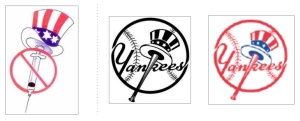Today’s question is fairly straightforward: can you register a parody trademark? If your logo or word mark is explicitly making fun of another party’s registered trademark, will the United States Patent and Trademark Office allow yours to be registered? A recent case involving the New York Yankees answered this question.
The Case
The case is New York Yankees Partnership v. IET Products and Services, Inc. It was heard before the Trademark Trial and Appeal Board.
Quick refresher here: When you apply to register a trademark with the USPTO, and someone opposes that application, it’s heard before the Trademark Trial and Appeal Board (TTAB.) A TTAB proceeding is like a court trial, except it generally takes place on paper, and, rather than a jury, the decision is rendered by a TTAB panel.
In 2008, IET applied to register three trademarks: two (1, 2) for THE HOUSE THAT JUICE BUILT (a play on the famous Yankee Stadium moniker “The House That Ruth Built,”) and one with an image similar to the Yankees’ logo, but with the baseball bat replaced by a syringe and the baseball replaced by the red universal prohibition symbol (or what I used to refer to as “that red circle thing in the Ghostbusters logo.”) IET’s image can be seen below next to the Yankees logos in black and white and color.
 The Yankees opposed the application and the parties have spent over 6 years battling it out through the TTAB. My regular readers will recognize that this is not an unusual time frame – if you’re getting into a trademark fight, be prepared to wait a long time for the resolution.
The Yankees opposed the application and the parties have spent over 6 years battling it out through the TTAB. My regular readers will recognize that this is not an unusual time frame – if you’re getting into a trademark fight, be prepared to wait a long time for the resolution.
Dilution
The basis of the TTAB proceeding was the Yankees’ claim of Dilution by Blurring. I’ve been writing about Trademark Dilution for years, going back to the great Ben & Jerry’s case of 2012, but in case you need a review, here it goes:
Trademark Dilution is a claim by a trademark owner that the use of the mark by the defendant would diminish the goodwill embodied in the trademark – even if the defendant is not using the mark in connection with similar goods or services. What does that all mean?
First of all, a claim of trademark dilution can only be asserted by the owner of a famous trademark. The mark must be nationally well known. Ford, Disney, Coca-Cola, and, yes, Ben & Jerry’s, are the types of marks that would clearly qualify for protection under the Trademark Dilution Revision Act of 2006.
There are two forms of trademark dilution: Dilution by Blurring and Dilution by Tarnishment. Blurring was at issue in the Yankees’ case.
Dilution by Blurring applies where the defendant’s use of the mark would diminish the uniqueness of the mark.
Isn’t Parody Protected by the First Amendment?
IET argued that because parody is protected under the First Amendment, the USPTO should allow the registration of parodic trademarks, regardless of dilution. The TTAB disagreed:
Applicant is referring to one of the dilution “exclusions” provided in Section 43(c)(3) of the Trademark Act, which reads as follows:
(3) Exclusions.–The following shall not be actionable as dilution by blurring or dilution by tarnishment under this subsection:
(A) Any fair use, including a nominative or descriptive fair use, or facilitation of such fair use, of a famous mark by another person other than as a designation of source for the person’s own goods or services, including use in connection with—
…
(ii) identifying and parodying, criticizing, or commenting upon the famous mark owner or the goods or services of the famous mark owner.
…
(B) All forms of news reporting and news commentary.
(C) Any noncommercial use of a mark.
Based on that language, for a parody trademark to be registered, it must meet one of the following three qualifications:
- It must not designate the source of goods or services;
- It must be for news purposes; or
- It must be noncommercial.
IET didn’t meet any of these qualifications. Its use was commercial, and it wasn’t for news purposes (it’s certainly not news that the Yankees were steroid abusers, ha ha.) As for #1, well, that’s what a trademark is, after all – an indicator of the source of goods or services.
As the TTAB stated:
We now choose to not consider the parody defense as part of the assessment of the dilution claim, because…a mark that identifies source – which it must for registration – will not concurrently qualify for a statutory exclusion to a dilution claim. Stated another way, when an applicant’s mark is registrable, because it is being used in commerce to indicate source, such use is not a noncommercial use or fair use.
In a sense, the analysis works. In order for a trademark to be registered, it must designate the source of goods or services…and if it designates the source of goods or services, it can’t be noncommercial (note that “noncommercial” and “nonprofit” are not the same thing.) So if the mark is a parody that dilutes an existing mark, it can’t be registered.
The news reporting exception is a bit of an outlier here, but since it didn’t apply, it wasn’t necessary for the TTAB to address that point.
Conclusion
Unless a court overrules this TTAB decision, the rule is: a mark that’s a parody of an existing trademark, and which dilutes that mark, can’t be registered.
Note: Nobody is saying IET can’t use these words or images. They simply are not eligible for USPTO trademark registrations. Freedom of speech and freedom to register a trademark are not necessarily the same thing.

